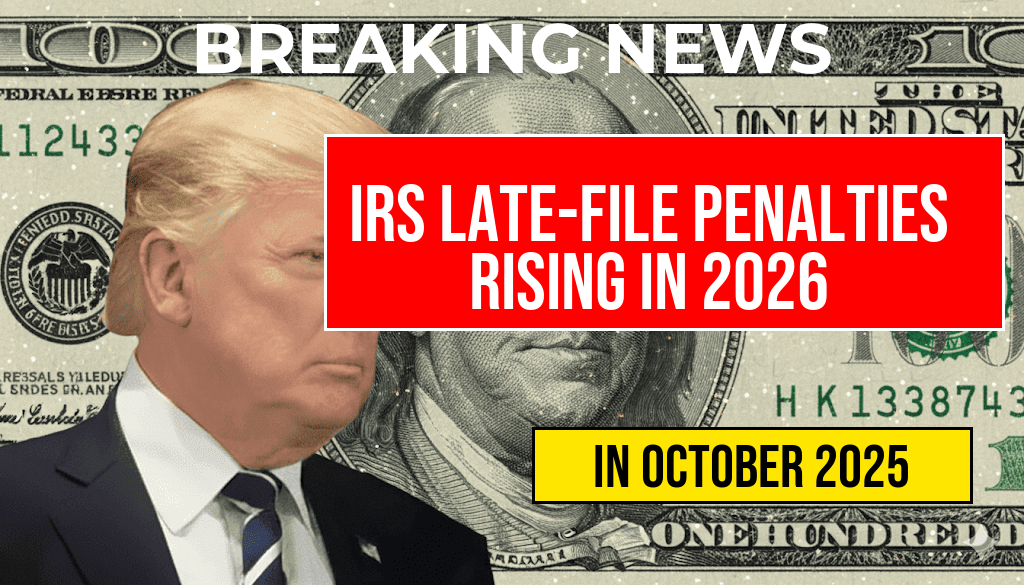The Internal Revenue Service (IRS) is set to increase late-filing penalties starting in 2026, a change that could cost taxpayers significantly more if they fail to file their returns on time. Currently, the penalty for late filing is $210 per month for each month or part of a month that a return is late, with a cap at 12 months. However, under the new regulations, this penalty could rise to as much as $485. This increase is part of the IRS’s broader effort to enforce compliance and ensure that taxpayers meet their obligations. As tax season approaches, it is crucial for individuals and businesses alike to understand these changes and take proactive steps to avoid costly mistakes.
Understanding the New Penalty Structure
The IRS has announced that the increase in late-filing penalties will be implemented in stages, with the full penalty expected to take effect by 2026. The new structure aims to reflect inflation and the increased cost of compliance. The potential $485 penalty is a significant jump, representing a more than double increase compared to the current rate.
Current vs. Future Penalties
| Time Frame | Current Penalty | Future Penalty (2026) |
|---|---|---|
| First Month Late | $210 | $485 |
| Subsequent Months (up to 12 months) | $210/month | $485/month |
Why This Change Matters
The increase in penalties is significant for various reasons. First, it places additional financial pressure on taxpayers who may already be struggling with compliance due to economic challenges. Second, it is part of a larger trend by the IRS to enhance its enforcement capabilities. According to IRS Commissioner Daniel Werfel, “Our goal is to ensure that all taxpayers meet their responsibilities and to promote a fair tax system.” This could mean more audits and stricter enforcement in the coming years.
Who Will Be Affected?
- Individual Taxpayers: Those who file their personal tax returns late will face the new penalties.
- Small Business Owners: Businesses that miss the filing deadline for their returns will also be impacted, which could affect cash flow and operations.
- Self-Employed Individuals: Freelancers and contractors who manage their own taxes must remain vigilant to avoid penalties.
How to Avoid Late-File Penalties
With the looming changes, taxpayers should consider several strategies to avoid late-filing penalties:
- File Early: Don’t wait until the last minute. Filing your taxes early can help you avoid penalties and even allow for more time to gather necessary documents.
- Use IRS Resources: The IRS provides a variety of resources and tools to help taxpayers understand their obligations. Visit the IRS website for up-to-date information.
- Consult a Tax Professional: If you’re unsure about your tax situation, seeking advice from a tax professional can help you navigate complex regulations.
Conclusion
The IRS’s impending changes to late-filing penalties serve as a stark reminder of the importance of timely tax compliance. With potential penalties skyrocketing to $485 per month starting in 2026, taxpayers should take immediate action to ensure they meet their filing deadlines. Understanding these changes today can save individuals and businesses from facing significant financial burdens in the future. For further details on IRS penalties and compliance, visit resources from reputable financial sites like Forbes or Wikipedia.
Frequently Asked Questions
What are the new IRS late-file penalties set to take effect in 2026?
The IRS late-file penalties will increase significantly in 2026, potentially raising the penalty amount to as much as $485 for individuals who fail to file their tax returns on time.
How can taxpayers avoid the increased penalties?
Taxpayers can avoid the increased late-file penalties by ensuring they file their tax returns by the due date, even if they cannot pay the full amount owed. Filing on time is crucial to avoid the higher fees.
Will the penalties affect both individuals and businesses?
Yes, the increased IRS late-file penalties will affect both individual taxpayers and businesses. It’s important for all filers to be aware of these changes to avoid unexpected costs.
What should I do if I miss the tax filing deadline?
If you miss the tax filing deadline, it is advisable to file your return as soon as possible to minimize penalties. Additionally, consider consulting a tax professional for guidance on how to proceed.
Are there any exceptions to the late-file penalties?
Yes, there are certain exceptions and relief options available, such as reasonable cause provisions. Taxpayers who believe they qualify should review the IRS guidelines or seek advice from a tax expert.






